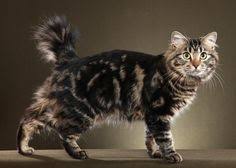
Korean Bobtail
Conditions of detention
Korean Bobtails are adaptable cats that can thrive in various living environments, from apartments to larger homes. They enjoy being part of the family and require an environment where they can interact with their human companions and explore their surroundings.
Useful Fact:
Korean Bobtails are known for their playful and social nature. They enjoy interactive play and will often engage in games with their human companions, making them excellent pets for active households.
Nutrition and diet
Korean Bobtails require a balanced diet of high-quality cat food that includes proteins, fats, vitamins, and minerals to support their active lifestyle and overall health. Fresh water should be readily available, and their diet should be monitored to prevent obesity.
Useful Fact: Korean Bobtails may have a high metabolism due to their active nature, so they might need slightly more food than less active breeds.
Health
Korean Bobtails are generally healthy with no specific breed-related health issues. Regular veterinary check-ups, vaccinations, and preventative care are essential to maintain their health. Common feline issues such as dental disease and obesity should be monitored.
Useful Fact: The genetic mutation that causes their unique tail does not typically lead to any health problems, making the Korean Bobtail a relatively robust breed.
Grooming and care
Korean Bobtails have moderate grooming needs. Weekly brushing is recommended for short-haired varieties, while long-haired ones may require more frequent brushing to prevent matting. Regular nail trimming, ear cleaning, and dental care are also necessary.
Useful Fact: Korean Bobtails often enjoy grooming sessions, which can be a good opportunity to bond with them.
Education and training
Korean Bobtails are intelligent and can be trained using positive reinforcement techniques. They can learn tricks, use a litter box efficiently, and follow basic commands with consistency and patience.
Useful Fact: Korean Bobtails are known for their agility and can often be trained to navigate obstacle courses or perform acrobatic tricks.
Toys and entertainment
Interactive toys, puzzle feeders, and climbing structures are ideal for keeping Korean Bobtails entertained. Providing a variety of toys helps to stimulate their active minds and prevent boredom.
Useful Fact: Korean Bobtails enjoy interactive play, such as fetch, and can be entertained for hours with the right toys.
Safety
Indoor living is recommended for Korean Bobtails to protect them from outdoor hazards such as traffic, predators, and diseases. Ensure windows and balconies are secure to prevent accidents.
Useful Fact: Korean Bobtails are known for their curiosity and may attempt to explore small spaces, so it’s important to thoroughly cat-proof your home.
Accessories
Essential accessories for a Korean Bobtail include a scratching post, comfortable bedding, litter boxes, and grooming tools. Interactive toys and climbing trees are also beneficial for their physical and mental stimulation.
Useful Fact: Providing a variety of textures and materials in their accessories can keep Korean Bobtails engaged and prevent boredom.
Socialization
Korean Bobtails are sociable and thrive on interaction with their human families and other pets. Early socialization helps them develop into well-adjusted adults who are comfortable in various environments.
Useful Fact: Korean Bobtails often form strong bonds with their owners and other pets, enjoying a social and interactive household.
Travel and Transportation
Korean Bobtails can adapt to travel if introduced gradually. Using a secure carrier and providing familiar items like a blanket or toy can help reduce travel-related stress.
Useful Fact: Some Korean Bobtails may enjoy exploring new environments and can be trained to walk on a leash, making them good travel companions.
Behavior and psychology
Korean Bobtails are affectionate, playful, and inquisitive cats. They are known for their loyalty and strong bonds with their owners, often displaying dog-like behavior in their interactions.
Useful Fact: Korean Bobtails can be quite vocal and expressive, using a variety of sounds to communicate their needs and feelings to their owners.


